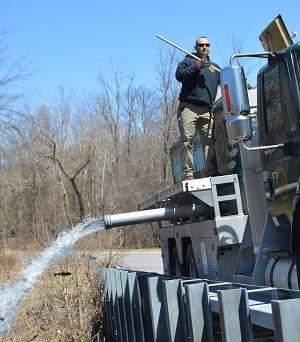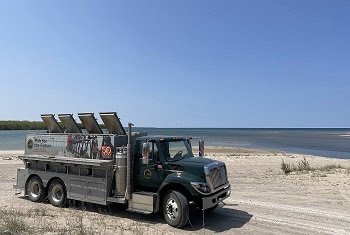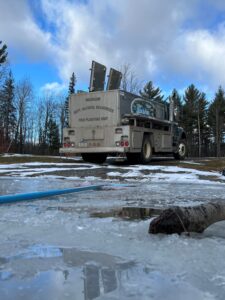Michigan: more than 21 million fish stocked in 2018 means great fishing opportunities

Rainbow trout, chinook salmon, steelhead and seven other species and one hybrid were among the 21,116,476 fish – weighing a combined 333 tons – stocked in Michigan’s public waters so far this year.
DNR staff made 381 trips to nearly 800 stocking sites including Great Lakes, inland lakes and rivers. Eighteen specialized trucks traveled 103,618 miles and 2,619 hours to deliver the valuable cargo.
The number and type of fish stocked varies depending on stocking requests, hatchery rearing assignments, and the source and temperature of each facility’s rearing water. Michigan has six state hatcheries and two cooperative hatcheries that together produce the species, strain and size of fish requested by fisheries managers. These fish are delivered at a specific time and location to ensure their survival and success.
Each hatchery has stocked the following fish (details on weight and sites are available on the DNR’s fish stocking webpage):
- Harrietta State Fish Hatchery (west of Cadillac) stocked 1,126,801 brown and rainbow trout.
- Marquette State Fish Hatchery (near Marquette) stocked 549,765 yearling lake trout, brook trout and splake (a hybrid of lake trout and brook trout).
- Oden State Fish Hatchery (near Petoskey) stocked 659,638 brown and rainbow trout.
- Platte River State Fish Hatchery (near Honor) stocked 2,137,473 fish including yearling Atlantic and coho salmon and spring fingerling chinook salmon.
- Thompson State Fish Hatchery (near Manistique) stocked 1,011,134 fish including yearling steelhead and spring fingerling chinook salmon.
- Wolf Lake State Fish Hatchery (near Kalamazoo) stocked 1,154,861 fish including yearling steelhead, spring fingerling chinook salmon, Great Lakes strain muskellunge and channel catfish.
A cooperative teaching hatchery at Lake Superior State University (in Sault Ste. Marie) stocked 34,973 Atlantic salmon.
This year’s total included 14.4 million walleye spring fingerlings and fry. These fish are reared in ponds by the DNR and tribal partners, with extensive support provided by local sporting organizations. The fish were stocked at 125 inland lakes and rivers and seven Great Lakes sites.






